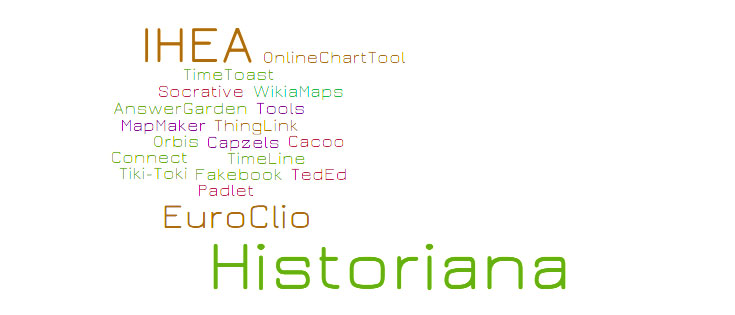Dear Teachers,
Welcome to the first blog in what will hopefully be a long range of blogs about online tools for history education. In this blog I will first give a short introduction of who we are. Secondly I will provide a short overview of the purpose and timeframe of these blogs.
We, the writers of these blogs, are all part of the Historiana Online Learning Team. The team consists of several members from different countries. Each member will introduce himself or herself in the first blog they write, but if you want some info on the team now you can visit the EUROCLIO page on this project.
Why these blogs you might wonder? Well the idea originated last August (2015) from one of the meetings of the Historiana Online Learning Team. While the main goal of the team is to develop both online tools and ready to use content in collaboration with EUROCLIO, we figured we should not just bypass existing tools that are available at this very moment. During our meeting we discussed options for screening and sharing our ideas on the tools we found on the web and then blogging as a ‘fast medium’ came up. We start this series off with two shorter introductary blogs, this being the first and the second being about online tools and teacher training. After these initial two each blog will be about one existing online tool or type of online tool, for example timeline tools. Dozens of these tools can be found on the web. The question is: what are the most important features of these tools and, more importantly, what are effective ways of using them in your history class?
We live in a time where people believe that computers and digital applications can truly revolutionise education. Some schools and educational institutes claim to be on the forefront of this ‘revolution’, by introducing such things as iPad classes. While in theory this sounds very innovative indeed, in practice just tossing a few iPads into a classroom and shouting ‘digitise’ doesn’t seem like the way to go. To be honest: this even bypasses the most important factor in education: YOU!
Yes, YOU, Teachers, YOU MATTER! This claim is supported by a recent study from OECD on the use of computerised learning (the report can be found on this link). Of course access to relevant digital means (including having enough computers available, as well as a stable internet connection) is important, but not as important as having a teacher making optimal use of these means; making them significant for learning. In comparison, while good instruments are invaluable, it is the musician who actually makes the music. With our blogs we hope to provide you with some ideas on how to use several online tools, as well as some inspiration on how to effectively implement them in your history class.
For now keep in mind that we view digital tools as a means to an end, not an end in itself. That is the way we approach them. More on that in the next blog entry, which comes right after this one.
Kind regards,
Pascal Tak
